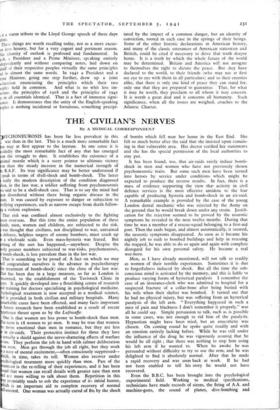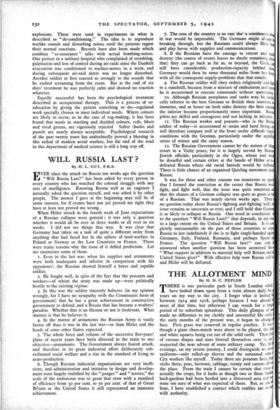THE CIVILIAN'S NERVES
By A MEDICAL CORRESPONDENT
YCHONEUROSIS has been far less prevalent in this war than in the last. This is a much more remarkable fact an may at first appear to the layman. In one sense it is idedly the most remarkable fact of any that has emerged um the struggle to date. It establishes the existence of a tional morale which, is a surer pointer to ultimate victory n than the steady increase in the numerical strength of e R.A.F. Its true significance may be better understood if speak in terms of shell-shock and bomb-shock. The latter really the modem description of the condition diagnosed hen, in the last war, a soldier suffering from psychoneurosis as said to be a shell-shock case. That is to say the mind had en disordered without there being organic disease in the . It was caused by exposure to danger or subjection to rrifying experiences, such as narrow escape from death follow- g a violent explosion.
That risk was confined almost exclusively to the fighting rces overseas. But this time the entire population of these ands, men, women and children, are subjected to the risk. was thought that civilians, not disciplined to war, untrained defence, helpless targets of enemy bombers, must crack up a wholesale scale. Even mass-hysteria was feared. But thing of the sort has happened,—anywhere. Despite the stly greater numbers subjected to war-risks, psychoneurosis, bomb-shock, is less prevalent than in the last war.
That is something to be proud of. A fact on which we may ell congratulate ourselves is the advance in psychotherapy treatment of bomb-shock) since the close of the last war. has been due in a large measure, so far as London is ncemed, to the establishment of the Tavistock Clinic in 20. It quickly developed into a flourishing centre of research d training for doctors specialising in psychological medicine. ychological treatment is now accepted as a medical science, I is provided in both civilian and military hospitals. Many markable cures have been effected, and many facts important future research have been established as a result of recent perience thrust upon us by the Luftwaffe. • One is that women are less prone to bomb-shock than men.
e ratio is 18 women to 3o men. It may be true that women more emotional than men in romance, but they are less in air-raids. Their protective instinct for those they love actually a shield against the nerve-shattering effects of warfare ses. They perform the job in hand with calmer deliberation an men. Men get through the job all right, but they work a state of mental excitement,—often consciously suppiessed- inch, in time, takes its toll. Women also recover under ychological treatment more quickly than men. Part of the catment is the re-telling of their experiences, and it has been and that women can recall details with greater ease than men d arc more willing to talk about them. Repetition in this ay invariably tends to rob the experience of it initial horror, Inch is an important aid to complete recovery of normal -control. One woman was actually cured of fits by the shock of bombs which fell near her home in the East End. She felt so much better after the raid that she insisted upon remain- ing in that vulnerable area. Her doctor verified her statements and she has the special permission of the local authorities to stay put.
It has been found, too, that air-raids rarely induce bomb- shock in men and women who have not previously shown psychoneurotic traits. But some such men have been turned into heroes by service under conditions which might be expected to produce the reverse results. In fact, there is a mass of evidence supporting the view that activity in civil defence services is the most effective antidote to the fear capable of producing hysteria and bomb-shock in an air-raid. A remarkable example is provided by the case of the young London dental mechanic who was rejected by the Army on the ground that he would break down under any strain. Justifi- cation for the rejection seemed to be proved by the neurotic symptoms he revealed in the next twelve months. During that time he was a member of i rescue-squad belonging to a first-aid post. Then the raids began, and almost automatically, it seemed, the neurotic symptoms disappeared. As soon as it became his nightly job to rush to bombed buildings and help in rescuing the trapped, he was able to do so again and again with complete disregard for his own personal safety. He became a real war-hero.
Men, as I have already mentioned, will not talk so readily as women of their terrible experiences. Sometimes it is due to forgetfulness induced by shock. But all the time the sub- conscious mind is activated by the memory, and this is liable to produce varying forms of hysterical paralysis I remember the case of an insurance-clerk who was admitted to hospital for a suspected fracture of a collar-bone after being buried with his wife when their sbelter was bombed. It turned out that he had no physical injury, but was suffering from an hysterical paralysis of the left arm. " Everything happened in such a mist of pain and blackness I don't remember it properly," was all he could say. Simple persuasion to talk, such as is possible in some cases, was not enough to rid him of the paralysis. Hypnotism might have been tried, but an anaesthetic was chosen. On coming round he spoke quite readily and with an emotion entirely lacking before. While he was still under the influence of the drug he was vigorously assured that he would be all right ; that there was nothing to stop him using his left arm if he wanted to. When he awoke he was persuaded without difficulty to try to use the arm, and he was delighted to find it absolutely normal. After that he made a rapid recovery and was soon back at work. If he had not been enabled to tell his story he would , not have recovered.
Even the B.B.C. has been brought into the psychological experimental field. Working to medical specifications, technicians have made records of sirens, the firing of A.A. and machine-guns, the sound of planes, dive-bombing and explosions. These were used in experiments in what is described as "de-conditioning." The idea is to reproduce warlike sounds and disturbing noises until the patients regain their normal reactions. Records have also been made which combine " re-assurance " talks with actual bombing-noises. One patient in a military hospital who complained of trembling, palpitation and loss of control during air-raids since the Dunkirk evacuation was conditioned to warfare-noises in a week, and during subsequent air-raid alerts was no longer disturbed. Another soldier at first reacted so strongly to the sounds that he rushed screaming from the room. But at the end of six days' treatment he was perfectly calm and showed no• reaction whatever.
Equally successful has been the psychological treatment described as occupational therapy. This is a process of re- education by giving the patient something to do—regulated work specially chosen to meet individual needs. Where colours are likely to occur, as in the case of rug-making, it has been found that wools in startling and decided colours, reds, blues and vivid greens, are vigorously rejected Softer shades and pastels are nearly always acceptable. Psychological research of the past twenty years has undoubtedly proved a blessing in this ordeal of modern aerial warfare, but the end of the road in this department of medical science is still a long way off.



























 Previous page
Previous page